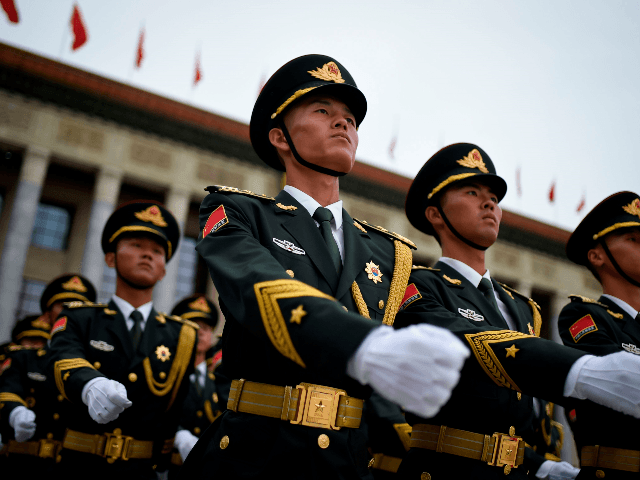China’s state-run Global Times newspaper warned in a column published Wednesday that the “dysfunctional” state of the modern world, spearheaded by the unorthodox diplomacy of President Donald Trump, will lead to the creation of a world where all nations “will need China.”
The Global Times, along with other Communist Party publications and the Party itself, regularly articulates a worldview in which the planet is divided between the Communists’ “harmony” and the “chaos” of free, democratic societies. During a now historic speech in 2017, Communist Party chief Xi Jinping announced that China would now “take center stage” in the world, usurping the position held by America. That fantasy has not yet fully materialized, but Trump is moving the world towards finally realizing the wisdom of submitting to China’s communists, the newspaper argued.
A separate column in the Global Times on Thursday made an adjacent argument for allowing the Chinese regime to impose its standards in everything from ethics to technology on the rest of the world, lamenting that Western powers were uncomfortable with Xi’s open bid for hegemony.
“World order is dysfunctional in some key aspects. A sense of insecurity is spreading. After the U.S. made a few moves out of traditional rules, it has become even more wild-minded, while the negative effects are brewing,” the Global Times warned on Wednesday. “Developed countries are at a loss in the face of the future, particularly the U.S. which spreads anxiety worldwide.”
“The West’s old political and economic tools can no longer solve current problems,” the Times concludes, listing the U.S. trade dispute with China, the controversy surrounding the U.K.’s recently departed U.S. ambassador, and growing economic tensions between Japan and South Korea as evidence of the impending collapse of the current world order. “There are disagreements on security risks and national interests. The Cold War mentality remains, but globalization demands different considerations. The line between an enemy and friend is becoming vague.”
The Times suggests that Beijing will rise above the perceived chaos.
“For China, the key is to develop, fully open up and make friends worldwide. When globalization is eroded, we should remedy it. As the world falls into disorder, all countries, including the US, will need China,” the newspaper predicts.
On Thursday, the Global Times addressed a slightly different issue: technological, scientific, and governmental global standards. Yet it offered a similar solution: the world should put all its faith in the Chinese Communist Party.
“[S]ome Western countries and observers have raised an eyebrow over growing overseas applications of Chinese standards, accusing China of exporting technical standards for everything from infrastructure, artificial intelligence to 5G technology intended to dominate global standards,” the newspaper griped. “Some Western countries, especially the US, are upset that China may have a bigger say in standards-setting in key technological areas. What they are concerned with are their own interests rather than global technological development. This shows they are narrow-minded.”
“It’s suggested the Western countries learn to adapt to Chinese standards, as the increasing weight of China in global standards-setting is inevitable,” the article concluded.
Chinese state media regularly promote the message that Xi delivered in 2017 that China would control the world in the near future.
“It is time for us to take center stage in the world and to make a greater contribution to humankind,” Xi declared at the time, rolling out “Xi Jinping Thought,” his philosophy of Han Chinese supremacism.
Xi Jinping has defined his tenure as one in which the Chinese state will rise to dominate the world, primarily through the spread of his Belt and Road Initiative (BRI), a plan for China to help build a new global transport infrastructure that would give the Communist Party control of every major port, railway, and road in the world, starting with the roads connecting Eurasia. The BRI is the economic driver behind Xi’s illegal colonization of the “maritime silk road” in the South China Sea, where the Communist Party has built major military facilities and elbowed the smaller nations that rightfully own the territory out of their own waters.
At home, Xi is facing significant challenges due to his administrations’ inability to competently provide basic government services. Xi’s government is presiding over a major vaccine scandal that left over one million children effectively unvaccinated as corrupt medical companies with ties to the regime administered faulty or expired vaccines. Angry parents have organized unprecedented protests, in one case gang beating a public official. Elderly veterans have protested Xi for withholding their pensions, angering patriotic Chinese communists, and those forced to live next to giant garbage piles, the result of Xi’s disregard for environmental policy, have taken the streets demanding transparency on waste management and pollution in their neighborhoods.

COMMENTS
Please let us know if you're having issues with commenting.